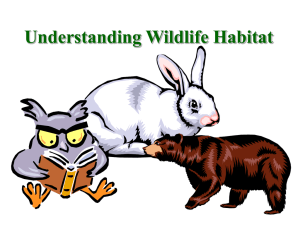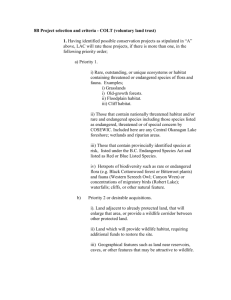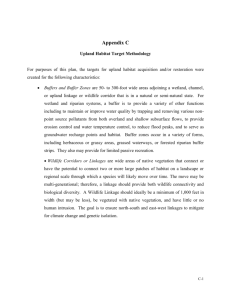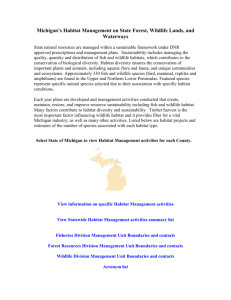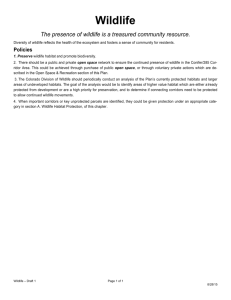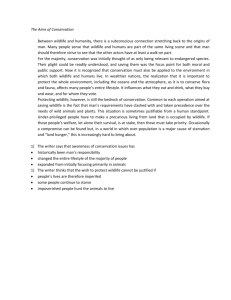Population Biology - Wildlife Ecology and Conservation
advertisement
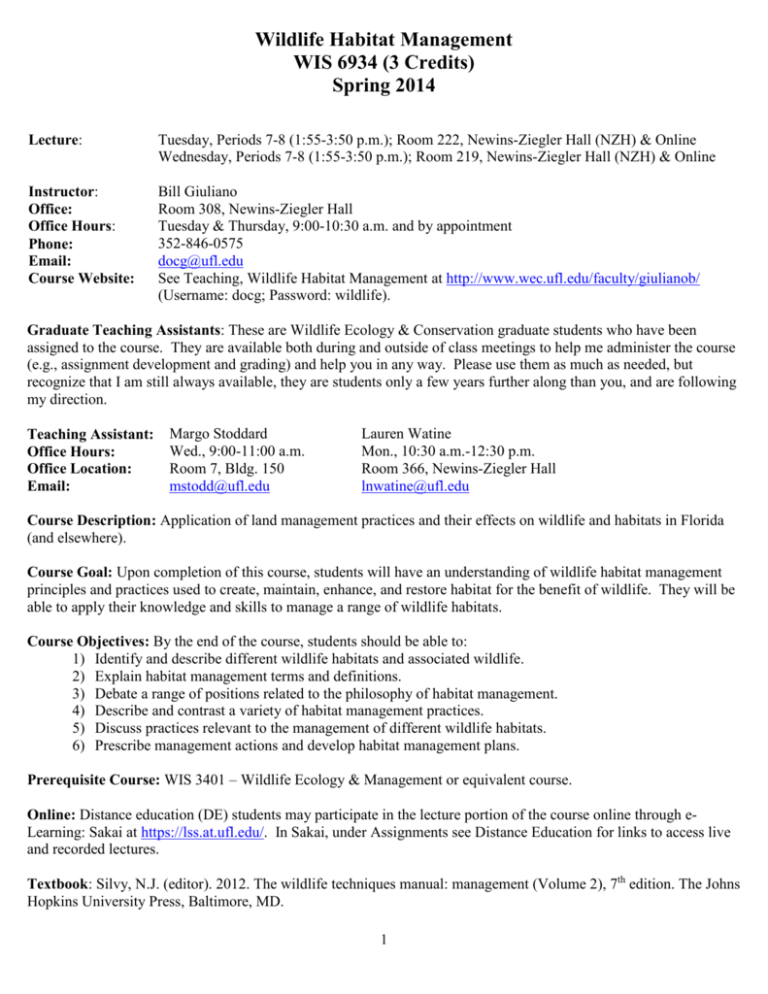
Wildlife Habitat Management WIS 6934 (3 Credits) Spring 2014 Lecture: Tuesday, Periods 7-8 (1:55-3:50 p.m.); Room 222, Newins-Ziegler Hall (NZH) & Online Wednesday, Periods 7-8 (1:55-3:50 p.m.); Room 219, Newins-Ziegler Hall (NZH) & Online Instructor: Office: Office Hours: Phone: Email: Course Website: Bill Giuliano Room 308, Newins-Ziegler Hall Tuesday & Thursday, 9:00-10:30 a.m. and by appointment 352-846-0575 docg@ufl.edu See Teaching, Wildlife Habitat Management at http://www.wec.ufl.edu/faculty/giulianob/ (Username: docg; Password: wildlife). Graduate Teaching Assistants: These are Wildlife Ecology & Conservation graduate students who have been assigned to the course. They are available both during and outside of class meetings to help me administer the course (e.g., assignment development and grading) and help you in any way. Please use them as much as needed, but recognize that I am still always available, they are students only a few years further along than you, and are following my direction. Teaching Assistant: Office Hours: Office Location: Email: Margo Stoddard Wed., 9:00-11:00 a.m. Room 7, Bldg. 150 mstodd@ufl.edu Lauren Watine Mon., 10:30 a.m.-12:30 p.m. Room 366, Newins-Ziegler Hall lnwatine@ufl.edu Course Description: Application of land management practices and their effects on wildlife and habitats in Florida (and elsewhere). Course Goal: Upon completion of this course, students will have an understanding of wildlife habitat management principles and practices used to create, maintain, enhance, and restore habitat for the benefit of wildlife. They will be able to apply their knowledge and skills to manage a range of wildlife habitats. Course Objectives: By the end of the course, students should be able to: 1) Identify and describe different wildlife habitats and associated wildlife. 2) Explain habitat management terms and definitions. 3) Debate a range of positions related to the philosophy of habitat management. 4) Describe and contrast a variety of habitat management practices. 5) Discuss practices relevant to the management of different wildlife habitats. 6) Prescribe management actions and develop habitat management plans. Prerequisite Course: WIS 3401 – Wildlife Ecology & Management or equivalent course. Online: Distance education (DE) students may participate in the lecture portion of the course online through eLearning: Sakai at https://lss.at.ufl.edu/. In Sakai, under Assignments see Distance Education for links to access live and recorded lectures. Textbook: Silvy, N.J. (editor). 2012. The wildlife techniques manual: management (Volume 2), 7th edition. The Johns Hopkins University Press, Baltimore, MD. 1 Readings: Copies of readings will be available online through the course website (see below). Readings, in addition to text chapters, must be reviewed prior to the appropriate class. Course materials: The course syllabus, lecture outlines, and prerecorded lectures will be available on the course website. Materials will require Adobe Acrobat Reader (available free of charge at http://www.adobe.com/products/acrobat/readstep2.html) and/or MS PowerPoint to access and print. Access to this information is password-protected. Evaluation: To assess how well we achieve course goals and objectives and allow you to demonstrate your knowledge and skills in the principles and practices of wildlife habitat management and their application in solving wildlife habitat management problems, we have developed several evaluation instruments (i.e., exams and other assignments). Because students differ in which method best evaluates their true knowledge and understanding, we varied both the type (e.g., exams vs. conservation plan) and form of assessment within (e.g., multiple choice vs. graphics/models) evaluation instruments (described below). Grading: Grades: Midterm Exam (100 pts) & Final Exam (200 pts) Conservation Plan Habitat Presentation Field Exercises (4 @ 50 pts each) Reviews (10 @ 10 pts each) Participation Total 300 pts 200 pts 100 pts 200 pts 100 pts 200 pts 1100 pts A (990 pts), B (880-989 pts), C (770-879 pts), and E (≤769 pts). Grading Policy: If there is a summation error for points on any exam or assignment, see me immediately so I can correct your total score/points. If you believe that an exam question, exam overall, or other assignment was improperly graded, please bring it to me for reevaluation. In such cases, the entire exam or assignment will be reevaluated, and a new grade assigned for the entire exam or assignment. Please regularly check the grades for exams and other assignments on the course website, and notify me immediately if a grade is incorrectly recorded. Exams: All exams will consist of a combination of multiple-choice (with multiple correct answers possible), true/false, matching, short answer, essay questions, and graphics/models (e.g., diagrams) in multiple parts that will allow you to demonstrate your knowledge and ability to synthesize, integrate, and apply knowledge and skills. The Final Exam will emphasize (>50%) material covered since the previous exam, but will be comprehensive. If you do not complete an exam during the assigned period, you will receive a grade of zero (0) for that exam. Make-up exams will only be given if you have an approved absence (i.e., arranged before the absence and you have a note from a medical doctor or an appropriate University official). You are responsible for all material covered in assigned text chapters, readings (including the internet), videos, lectures, discussions, habitat presentations, and guest speakers. Review sessions will be scheduled before each exam. Exams are closed book; books, notes, papers, computers (except the one a student is working on to access e-Learning: Sakai), other electronic devices, headphones, earpieces, and other listening devices are not permitted to be used or in sight during an exam, and students must work alone. Non-DE students will complete Part I (the short answer, essay question, and graphics/models [e.g., diagrams] parts of exams) in the assigned classroom at the assigned class meeting time; DE students will complete Part I of the exams online through e-Learning: Sakai at https://lss.at.ufl.edu/. All students (DE and non-DE) will complete Part II (the multiple choice, true/false, and matching parts of exams) online through e-Learning: Sakai at https://lss.at.ufl.edu/. Questions for all parts of the exam will be randomly drawn from question pools. Each part of each exam is time limited. Additional instructions can be found on the course website. You must go online to the e-Learning: Sakai site and complete the Practice Exam by 1:55 p.m., January 14, 2014. Failure to complete this by this time/date will result in the loss of 20 points from the final course grade. If you have problems completing the practice exam, notify me immediately. 2 Conservation Plan: Based on visits to Caravelle Ranch WMA (5-6 April 2014), you will complete a conservation plan for the property. Vans will provide transportation from campus to and from the property. You may drive yourself. However, late arrival will lead to 10 points per hour penalty on your final course grade. The written plan will be graded on content, writing style/clarity, and grammar. Specific conservation plan guidelines and grade sheets will be provided during class and on the course website. You may use any information source (e.g., class and field notes, internet resources, library materials, and discussions with biologists and land managers) to prepare your plan. Conservation Plans will be submitted by all (DE and non-DE) students online through e-Learning: Sakai at https://lss.at.ufl.edu/. Additional instructions can be found on the course website. Late plans will lose 40 points for each day they are late unless associated with an approved absence (see Exams above). You must go online to the eLearning: Sakai site and complete the Practice Conservation Plan by 1:55 p.m., January 14, 2014. Failure to complete this by this time/date will result in the loss of 20 points from the final course grade. If you have problems completing the practice plan, notify me immediately. Habitat Presentation: Each student will prepare and deliver a 20-30 minute oral presentation (e.g., PowerPoint) on a particular Florida habitat. This will include a detailed description of the habitat (including resources, conditions, distribution, and status and details on how to identify this habitat in the field); plants (10) and animals (10) most commonly found in the habitat; obligate, threatened, and endangered wildlife species associated with the habitat; and management and restoration practices commonly associated with the habitat. Habitats will be randomly assigned to students by me. 2+ presentations will be delivered during selected class meetings (see Course Schedule). Additional instructions can be found on the course website. Late presentations will lose 20 points for each day they are late unless associated with an approved absence (see Exams above). Field Exercises: Each student will attend 4 exercises or complete a Report for each in lieu of attendance. All field exercises will begin a 6 a.m. (unless I tell you otherwise) at the location of the exercise (see below) and will continue until completed (usually all day). Attendance at a field exercise (documented by signing the attendance sheet) will result in receiving full credit (50 pts) for that exercise (minus any deductions described below). You may drive yourself. However, late arrival at an exercise will lead to 10 points per hour penalty on your exercise grade. Similarly, leaving an exercise early will lead to 10 points per hour penalty on your exercise grade. Note that the exercises take place over weekends, and may include staying overnight on Friday or Saturday evening. Thus, the vans may not be coming back to campus on the Saturday evenings or Sunday mornings to transport students. The trips are within 2 hours drive of campus. For all trips, lodging is provided free of charge on Friday and/or Saturday evening, if desired. If you do not attend an exercise, you will receive a grade of 0 pts for that exercise, unless a Report is completed. Each Report will be a ≤25 page (typed; 12 point font; 2.5 cm margins; single-spaced) document describing the use of habitat management tools and/or habitat management practices assigned to you by me, the habitats in which they might be applied, their effects on wildlife and habitat, and special considerations in their implementation. Your Report will also include a review of >5 scientific articles that detail the use of the tools or practices to manage the habitat of a particular species or group of species. Reports are due by 5 p.m. on the Friday immediately following the corresponding exercise. Reports will be submitted by all (DE and non-DE) students online through e-Learning: Sakai at https://lss.at.ufl.edu/. Additional instructions can be found on the course website. You will receive an automatic 10 points per day deduction for every day a Report is late, unless associated with an approved absence (see Exams above). Reviews: A ≤2 page review (typed; 12 pt font; 2.5 cm margins; single-spaced) for each of 10 articles (designated with ** in Readings Assignments below). The review will summarize the main points of the article and discuss how it relates to the course and what we are discussing in lecture and field exercises. All reviews must include a justification (i.e., an explanation of why you answered this way). Reviews will be submitted online through e-Learning: Sakai at https://lss.at.ufl.edu/ as an .rtf, .txt, .pdf, .doc, or .docx file, and are due by 1:55 p.m. on the date assigned in the Course Schedule and Reading Assignment list (see below). Turnitin (plagiarism checker) will automatically check all reviews. Additional instructions can be found on the course website. Late reviews will lose 2 points for each day they are late unless associated with an approved absence (see Exams above). 3 Participation: To understand wildlife habitats and their management and achieve the course goal, active participation and experience in each of the course classes, exercises, etc. is a necessity. All non-DE students are expected to attend every class (DE students are expected to view the class meeting by 11:00 p.m. on the Sunday immediately following each class). You are allowed to miss one, non-field exercise class without penalty. For each unexcused class absence after the first, 4 points will be deducted from your Participation grade (documented by signing the attendance sheet). Participation during classes covering management practices and systems management (marked with “*” in Course Schedule below) will be further evaluated by completing in-class assignments. Each assignment is worth 10 points, will be completed in 2 parts, and must be submitted during the associated class (DE students only can submit their assignment in e-Learning: Sakai by 11:00 p.m. on the Sunday immediately following the class). Part I will be an assessment evaluating your understanding of the readings and prerecorded lecture and Part II will include problem solving related to the current topic. You will receive an automatic 5 points per day deduction for every day an assignment is late, unless associated with an approved absence (see Exams above). Class Demeanor: Students who come to class late, have ringing cell phones, read the newspaper or other non-classrelated materials, play games, sleep, or who talk during class (on cell phones or to others in the class when it is not part of a class-related discussion), disrupt the class; for each such disruption, 10 pts will be deducted from the final course grade. e-Learning: Sakai: Sakai is only used to take Exams and submit Assignments (e.g., Conservation Plans and extra credit). All other functions in e-Learning: Sakai should be ignored. Please look to the course website (http://www.wec.ufl.edu/faculty/giulianob/) for all course information, materials, and scheduling. Students are responsible for using a reliable and fast computer and internet connection while completing exams and submitting assignments. Completing the Practice Exam and Practice Conservation Plan will allow you to assess your computer and internet connections. Working on campus computers and networks may be helpful. Unless the entire e-Learning: Sakai or UF Computer Network are slowed or not working, slow or lost connections and computers that “die” are not acceptable reasons for incomplete, unfinished, or missing exams and assignments. After submitting assignments in eLearning: Sakai, you will receive a confirmation email. You should make sure you receive this, and keep it. Turnitin (plagiarism checker) will automatically check all written assignments (e.g., Conservation Plans). Academic Honesty: Students are expected to become familiar with and follow current University Policy (see http://www.dso.ufl.edu/sccr/). Counseling: Students having class-related problems should regularly meet with the Instructor or Teaching Assistants during office hours or make special appointments. Additionally, there are resources on campus for students having various personal, career, and academic problems: http://www.counsel.ufl.edu/ & http://www.hsc.ufl.edu/shcc/. Students with Disabilities: Every possible accommodation will be made to allow students with disabilities to successfully complete the course (see http://www.dso.ufl.edu/drc/). Students requesting classroom accommodation must first register with the Dean of Students Office. The Dean of Students Office will provide documentation to the student who must then provide this to the Instructor when requesting accommodation. Sexual Harassment: It is the policy of The University of Florida to provide an educational and working environment for its students, faculty, and staff that is free from sex discrimination and sexual harassment. In accordance with federal and state law, the University prohibits discrimination on the basis of sex, including sexual harassment. Sex discrimination and sexual harassment will not be tolerated, and individuals who engage in such conduct will be subject to disciplinary action. The University encourages students, faculty, staff, and visitors to promptly report sex discrimination and sexual harassment. A person who believes that he or she has been subjected to sex discrimination or sexual harassment should report the incident to the Instructor or any University official, administrator, or supervisor. The Office of Human Resource Services investigates all complaints. Incidents should be reported as soon as possible after the time of their occurrence (larry-ellis@ufl.edu). 4 Course Schedule Date 1/7 1/8 1/14 1/15 1/21 1/22 1/28 1/29 2/4 2/5 2/11 2/12 2/18 2/19 2/25 2/26 3/4 3/5 3/11 3/12 3/18 3/19 3/25 3/26 4/1 4/2 4/8 4/9 4/15 4/16 4/22 4/23 5/1 Reading Assignments Topic Course Introduction Wildlife Habitat Wildlife Habitat Preparing Habitat Presentations General Considerations in Wildlife Habitat Management Philosophy of Wildlife Habitat Management e-Learning: Sakai Practice Exam and Practice Conservation Plan due (before 1:55 p.m.) Habitat Management Planning & Monitoring Hardwood Forested Uplands: Slope forest, Upland hardwood forest, Mesic hammock, & Xeric hammock * Management Practices: Prescribed Fire High Pine & Scrub: Upland mixed woodland, Upland pine, Sandhill, & Scrub * Management Practices: Grazing Pine Flatwoods & Dry Prairie: Wet flatwoods, Mesic flatwoods, Scrubby flatwoods, & Dry prairie * Management Practices: Mechanical Coastal Uplands: Beach dune, Coastal grassland, Coastal berm, Coastal strand, & Maritime hammock * Management Practices: Chemical * Management Practices: Natural & Artificial Features Midterm Exam non-DE students: Part I: 1:55 – 2:55 p.m., Room 219, Newins-Ziegler Hall and Part II: any 30 minute block, 2:55 – 11:55 p.m., e-Learning: Sakai DE students: Part I: any 60 minute block, 1:55 – 11:55 p.m. and Part II: any 30 minute block, 2:55 – 11:55 p.m., e-Learning: Sakai Misc. Misc. No Class – Spring Break No Class – Spring Break Freshwater Non-forested Wetlands – Prairies & Bogs: Seepage slope, Wet prairie, Marl prairie, & Shrub bog * Farmland Management Freshwater Non-forested Wetlands – Marshes: Depression marsh, Basin marsh, & Coastal interdune swale Misc. Conservation Plan Preparation * Rangeland Management Freshwater Non-forested Wetlands – Marshes: Floodplain marsh, Slough marsh, & Glades marsh * Forest Management Freshwater Forested Wetlands – Cypress/Tupelo: Dome swamp, Basin swamp, Strand swamp, & Floodplain swamp Freshwater Forested Wetlands – Hardwood: Baygall, Hydric hammock, Bottomland forest, & Alluvial forest Conservation Plan Preparation Marine & Estuarine Vegetated Wetlands: Salt marsh & Mangrove swamp Conservation Plan Due (before 1:55 p.m., e-Learning: Sakai) * Wetland & Coastal Management * Urban & Suburban Management FINAL EXAM (1A) non-DE students: Part I: 7:30 – 9:30 a.m., Room 222, Newins-Ziegler Hall and Part II: any 60 minute block, 9:30 a.m. – 11:55 p.m., e-Learning: Sakai DE students: Part I: any 120 minute block, 7:30 a.m. – 11:55 p.m. and Part II: any 60 minute block, 9:30 a.m. – 11:55 p.m., e-Learning: Sakai Note: Topics will be covered in the order indicated. However, the time allotted to each topic may vary. 5 1 2 3 4 5 6 7 8 9 10 11 12 13 14 Field Exercises & Conservation Planning Schedule Dates Topic Habitat Management Tools: Caravelle Ranch WMA 4/5 Conservation Plan: Caravelle Ranch WMA Habitat Management Tools: Caravelle Ranch WMA Habitats, Tools, & Practices: Caravelle Ranch WMA – Farmlands, rangelands, food plots, & dove fields 4/6 Conservation Plan: Caravelle Ranch WMA 4/12 Habitats, Tools, & Practices: Ocala National Forest – Forests Habitats, Tools, & Practices: Guana River WMA – Freshwater & coastal wetlands, scrub, flatwoods, & 4/13 dunes # 1 2 3 Reading Assignments Yarrow, G.K., and D.T. Yarrow. 1999. Managing wildlife. Chapter 3-Wildlife habitat management. Yahner, R.H. 1988. Changes in wildlife communities near edges. Conservation Biology 2:333-339. Van Horne, B. 1983. Density as a misleading indicator of habitat quality. Journal of Wildlife Management 47:893-901. Florida Natural Areas Inventory (FNAI). 2010. Guide to the natural communities of Florida: 2010 edition. Florida Natural Areas Inventory, Tallahassee, FL. Donlan, J., et al. 2005. Rewilding North America. Nature 436:913-914. ** Severns, P.M. 2010. Habitat restoration facilitates an ecological trap for a locally rare, wetland-restricted butterfly. Insect Conservation and Diversity 4:184-191. ** Harris, J.A. et al. 2006. Ecological restoration and global climate change. Ecological Restoration 14:170-176 ** Miller, J.R., and R.J. Hobbs. 2007. Habitat restoration-do we know what we are doing? Restoration Ecology 15:382-390. 4 5 6 7 8 9 10 11 12 13 14 ** Willcox, E.V., and W.M. Giuliano. 2011. Avian community response to pine flatwoods management. Forest Ecology and Management 261:1928-1935. Derner, J.D., et al. 2009. Livestock as ecosystem engineers for grassland bird habitat in the Western Great Plains of North America. Rangeland Ecology and Management 62:111-118. ** Augustine, D.J. 2004. Influence of cattle management on habitat selection by impala on central Kenyan rangeland. Journal of Wildlife Management 68:916-923. ** Pike, D.A., et al. 2011. Chainsawing for conservation: ecologically informed tree removal for habitat management. Textbook Chapter 30 Burger, L.W. 2006. Creating wildlife habitat through federal farm programs: an objective-driven approach. Wildlife Society Bulletin 34:994-999. ** Giuliano, W.M., and S.E. Daves. 2002. Avian response to warm-season grass use in pasture and hayfield management. Biological Conservation 106:1-9. ** Homyack, J.D., and W.M. Giuliano. 2002. Effect of streambank fencing on herpetofauna in pasture stream zones. Wildlife Society Bulletin 30:361-369. Textbook Chapter 27 Willcox, E.V., and W.M. Giuliano. 2010. Seasonal effects of prescribed burning and roller chopping on saw palmetto in flatwoods. Forest Ecology and Management 259:1580-1585. ** Vanak, A.T. et al. 2010. Do fences create an edge-effect on the movement patterns of a highly mobile mega-herbivore? Biological Conservation 143:2631-2637. Textbook Chapter 26 Ober, H.K., and J.L. Trusty. Forest groundcover restoration. Florida Cooperative Extension Service, WEC269. Ober, H.K. 2009. The importance of bottomland hardwood forests for wildlife. Florida Cooperative Extension Service, WEC271. Ober, H.K. 2009. The value of oaks to wildlife. Florida Cooperative Extension Service, WEC248. Ober, H.K., and P.J. Minogue. 2008. Managing oaks to produce food for wildlife. Florida Cooperative Extension Service, WEC249. Ober, H.K., and P.J. Minogue. 2007. Dead wood: key to enhancing wildlife diversity in forests. Florida Cooperative Extension Service, WEC238. Arny, N.P., and D.M. Flinchum. 2006. Common pines of Florida. Florida Cooperative Extension Service, FOR21. ** Hancock, M.H., et al. 2011. Burning and mowing as habitat management for capercaillie Tetrao urogallus: an experimental test. Forest Ecology and Management 262:509-521. Textbook Chapters 28 and 29 Textbook Chapter 31 FWC, et al. 2008. Wildlife habitat planning strategies, design features and best management practices for Florida communities and landowners. Chapter 9-Planning wildlife friendly golf courses in Florida. 6 7
